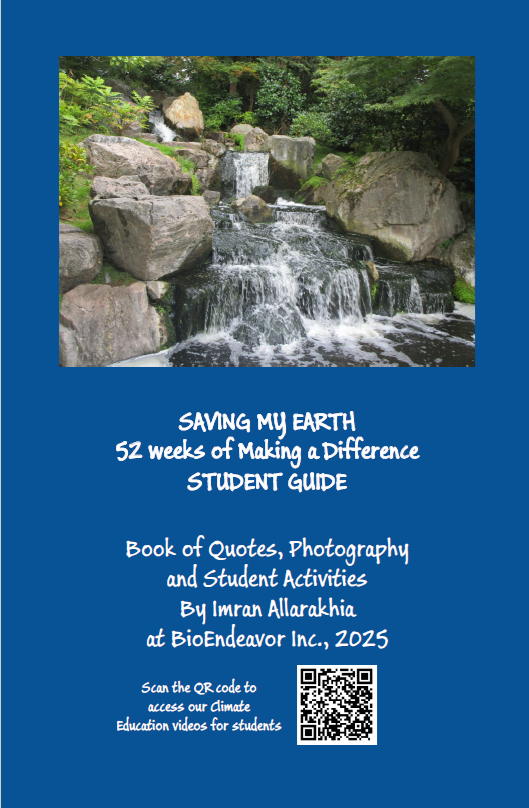Climate Education Series: Many Tiny Steps-Climate Change and Responsible Consumption
- Dr. Minna Allarakhia

- Aug 3, 2023
- 4 min read
Updated: Jan 15, 2024
Climate Education for Students Assignment 1:
Students will research what sustainable living, and responsible consumption entails. Specifically, students will research how consumers can live more sustainably. The goal is to view sustainability, from a personal perspective. Namely, what changes can we make in our lives, that are in line with sustainability, and the urgent need to address climate change. Students should share these practices as a class.
The teacher can create a checklist based on these collective practices, to enable students to conduct a personal audit of their lifestyles, including gaps where students can make the necessary behaviour change. Teachers should complete this exercise by brainstorming with the class, how their classroom environment can be made more sustainable.
Sustainability: Sustainability means that all human activities, are carried out at rates equal to, or less than the Earth’s ability to renew the resources used, and naturally reduce the waste generated. Sustainability also means, that meeting our current needs, should not affect the ability of others to meet their needs. We need to think about the future. How do we achieve this? In this module, we will explore what sustainable living means.
Resources: What is Sustainability? Sustainability
Sustainable Living: Sustainable living is more than the types of energy we use. Sustainable living is a lifestyle that attempts to reduce an individual’s footprint, by reducing the use of natural, and personal resources. Through an assessment of diet, health management, energy, and household management practices, methods of transportation used, as well as overall consumption patterns, we can learn to consume, and live responsibly.
Small Changes: Let’s start by asking how social distancing enabled you to make sustainable changes in your life. Ultimately, it is about taking many small steps. Think about the changes you have made as a family. Think first about food. Are you cooking at home? Are you gardening, and eating fresh food from your garden? Are you focusing more on a plant-based diet?
Spending time in Nature: Have you been spending more time in nature, and enjoying local activities? Research is showing that spending time in nature, can help with our physical, cognitive, and emotional well-being. Spending time, and exercising in nature, can help you to calm down, enhance your immune system, reduce your anxiety, improve your mood, help you to concentrate better, and even make you feel better about yourself. Beyond spending time in nature, your family can brainstorm ways to vacation locally, to reduce all of the travel related footprint connected to vacations. There is likely so much to see, and enjoy, in your own cities, states, and countries.
Resource: Nurtured by Nature
Working from Home and Transportation: How many parents are working from home? Many of us might also be worried about using mass transportation. Could more people opt to drive in to work? In the long-run, cities will need to invest more money into mass transportation, to move people around more efficiently, and to reduce the footprint associated with our vehicles.
Energy Usage: Think about what more you can do to reduce your energy usage. Have you been thinking, or reading about renewable energy? Imagine using the car battery, in your electric vehicle, to power your home. You also might have neighbors who have solar panels on their roofs, to provide energy to their homes, or to provide unused energy back to the grid.
Responsible Consumption: Let’s now talk about how much we consume as a family. What have you, or can you do to consume less. This is not an easy one, but hopefully we can all start thinking about our behaviour. Has your use of plastic increased with coronavirus? If yes, how has it increased? Given that plastic is made from oil, when oil prices fall, plastic is cheaper to produce. Single use plastics are becoming popular again, for example disposable items like water bottles, products wrapped safely in plastic including hand sanitizer, tissues, and food. Many governments across the world, are starting to ban single-use plastic. But we need to do more, by thinking about how we can consume less, and only what we truly need.
Water Usage: Let’s talk about water usage. How can we reduce our daily water usage, with a few simple behavioural changes? Discuss as a family, what changes you can make across your home, to reduce your water usage. For example, using low flow taps, using cold or warm water, instead of hot water, taking short showers, not running the water while brushing, even collecting rain water for our gardens. A small, but impactful change, is also drinking filtered, and refrigerated tap water, instead of bottled water.
Creating a Good Life:
Sustainable living can help us to create a good life not only for our families, but for others in our local, and global communities. It is not only about our choices, and health, but also about protecting all of the workers engaged in producing our products, and services; ensuring that they live a quality of life we expect for ourselves, as well as protecting our environment, so that we can indeed continue to live well.

Comments